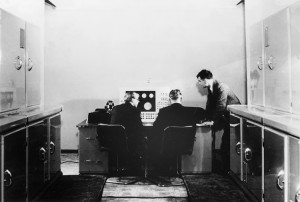A. M. Turing Award
April 19, 2019
Last month, on March 27, the Association for Computing Machinery (ACM) in New York City named the computer scientists Yoshua Bengio, Geoffrey Hinton, and Yann LeCun as the recipients of the annual A. M. Turing Award. Working both independently and together, Bengio, Hinton, and LeCun are considered fathers of the “Deep Learning Revolution” that has helped usher in a new era of artificial intelligence (AI).

Alan M. Turing (at right) was an English mathematician and computer pioneer. He made important contributions to the development of electronic digital computers.
Credit: Heritage-Images/Science Museum, London
The A. M. Turing Award is given to one or more individuals each year in recognition of contributions of lasting importance in the field of computing. Bengio, Hinton, and LeCun were rewarded for their conceptual and engineering breakthroughs that have made deep neural networks a critical component of computing. Neural networks are sets of algorithms, modeled loosely on the human brain, that are designed to recognize patterns. Neural networks can thus “learn” to “see,” “hear,” and “think” by differentiating among patterns. The networks are essential parts of driverless car technologies, automatic language translation programs, and automated personal assistants such as Alexa or Siri. They are also used in various forms of robotics as well as in automated stock trading and game playing programs.
Artificial neural networks were introduced in the 1980′s, but by the early 2000′s, Bengio, Hinton and LeCun were among a small group who remained committed to furthering the technology. Their work—and the work of many others—has contributed to the recent boom in “deep learning” computer electronics. Bengio is a professor at the University of Montreal and scientific director at Mila, the Quebec Artificial Intelligence Institute. Hinton is vice president and engineering fellow of Google, chief scientific adviser of the Vector Institute in Toronto, and professor emeritus at the University of Toronto. LeCun is a professor at New York University and vice president and chief AI scientist at Facebook.
The A. M. Turing Award is named after Alan Mathison Turing, a British mathematician and computer pioneer. Turing made key contributions to the development of electronic computers, including his work helping to build the first British electronic digital computer. In 1950, he proposed a test for determining if machines might be said to “think.” This test, now called the Turing test, is still central to discussions of artificial intelligence.
The first Turing Award was given to the American computer scientist Alan J. Perlis in 1966 for his role in developing influential computer-programming techniques. Since then, an award has been given every year. As of 2014, the award includes a $1 million cash prize. Bengio, Hinton and LeCun will formally receive the A.M. Turing Award at ACM’s annual awards banquet on June 15, 2019, in San Francisco, California.


